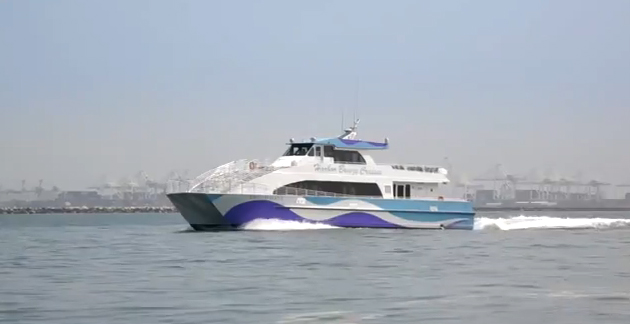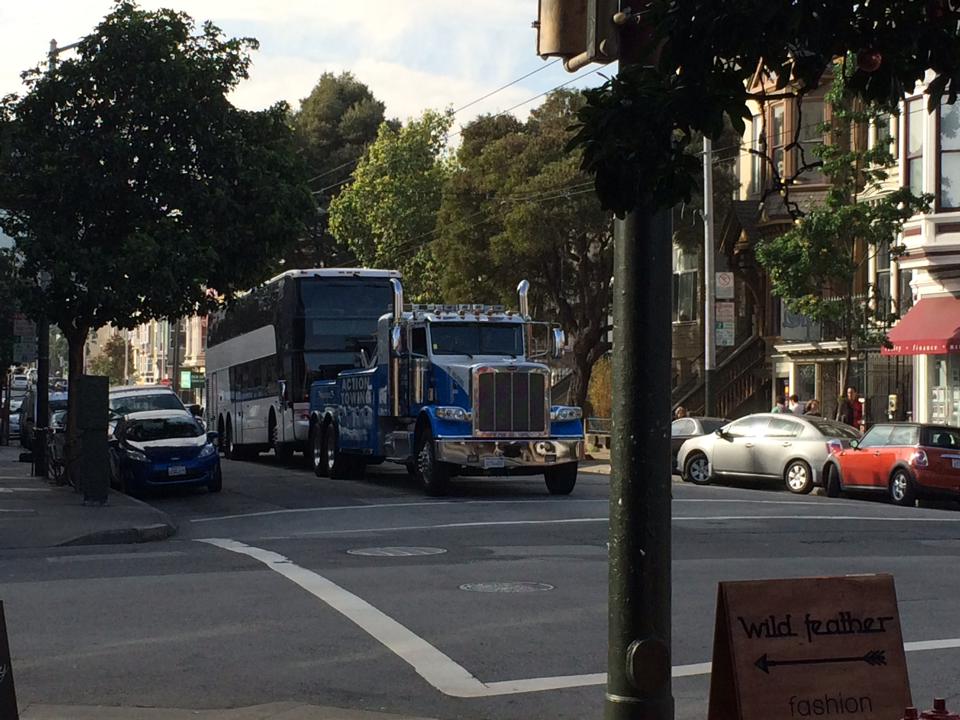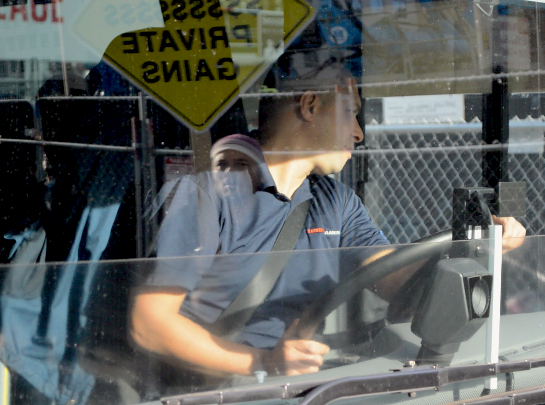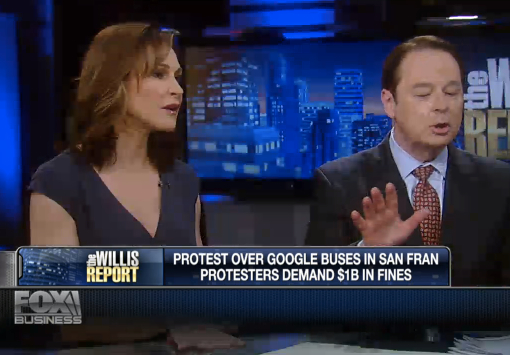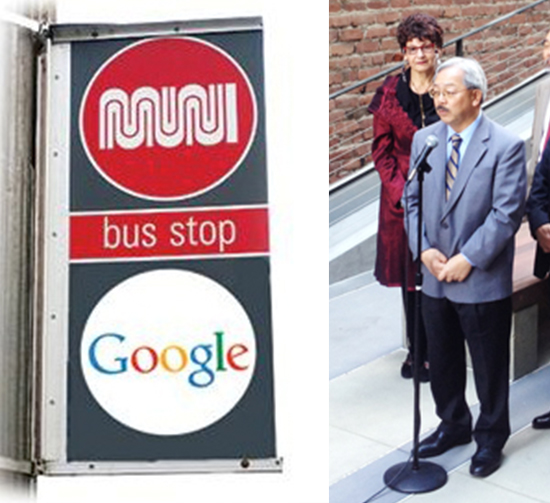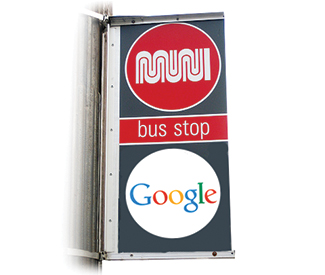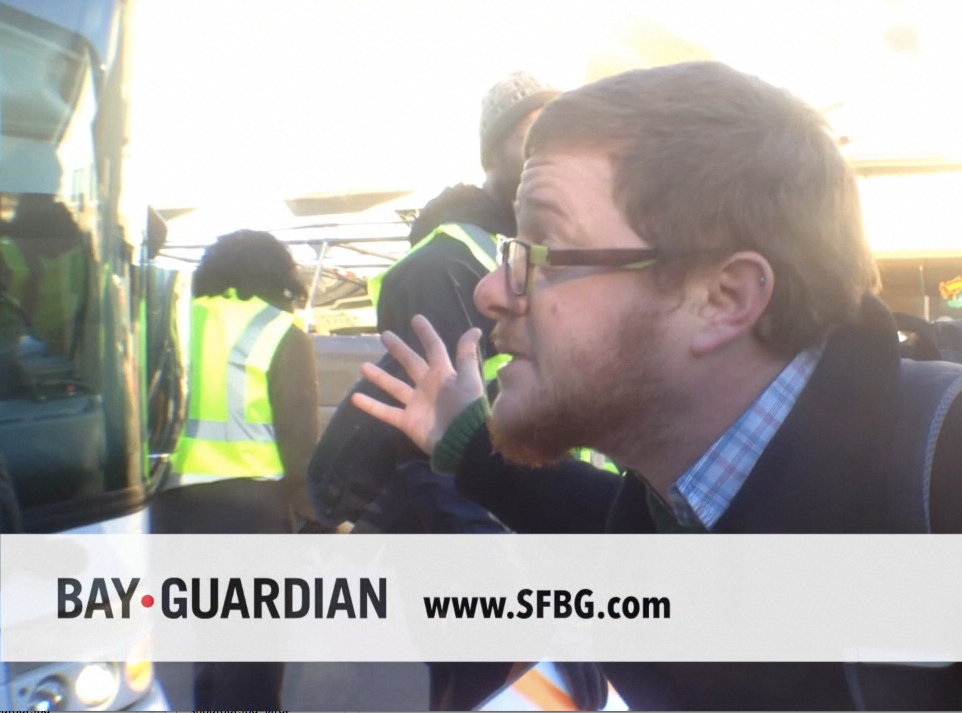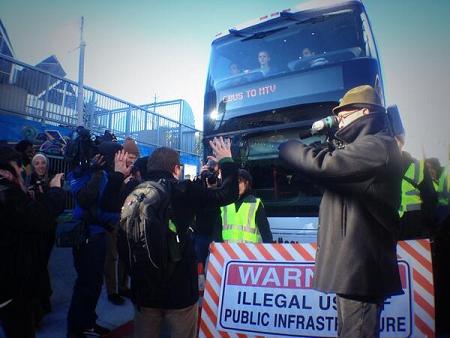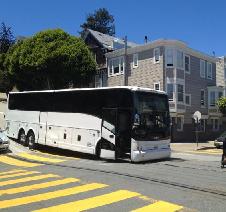At one point protesting tech buses was new and shiny, but now it barely registers a shrug from San Franciscans. The newest eviction protest took a different turn.
On Saturday, protesters jumped up on stage to interrupt Googlers meditating at the annual Wisdom 2.0 conference. The Google corporateers sat on the stage, ready to share their secret to mindfulness “the Google way.” No one said “meditate on all the money you’re making,” but maybe it was implied.
Meng Tan, who was identified on the Wisdom 2.0 website as “Google employee #107” (oh, inner circle!), is a corporate trainer who wrote the bestselling book Search Inside Yourself. He looked totally serene on stage, legs crossed. Next to him sat Bill Duane, a senior manager in charge of well-being, among other things. Hundreds were in the audience, watching. Duane began by trying to introduce Tan.
“I’ll start by introducing… not this person,” Duane said as the protesters unexpectedly strolled across the stage, carrying the now familiar banner championing an Eviction Free San Francisco, and the audience applauded.
“Wisdom means stop displacement, wisdom means stop surveillance, what do we want? Stop the evictions!” chanted Erin McElroy through a bullhorn, one of the lead organizers of the Anti-Eviction Mapping Project. She was at the forefront of the Google bus protests, as well as the TechCrunch protest, the Crappies.
The protesters were ushered off the stage, and security engaged in a tug of war with the protesters for their banner.
The protest group, Heart of the City, noted in their press release that video from the protest was not available on the conference’s website (though the protesters had their own camera on hand).
Was it intentional on Wisdom 2.0’s part to censor the protest?
“The only reason it’s not up is our AV guys cut the feed as soon as the protesters walked on stage,” Rita O’Connell, communications coordinator for Wisdom 2.0 told us. She said that other feeds were captured, and that it would be posted “as soon as humanly possible.”
“We are going to put it out,” she said. “We’re not intentionally trying to keep it from anyone’s view.”
We reached out to Google spokepeople, but our emails weren’t returned before press time.
Many reading this no doubt will wonder about the point of interrupting a Google presentation on meditation and spiritual well being to talk about evictions in San Francisco. What, if anything, do they have to do with one another?
The spiritual advocacy group The Bhuddist Peace Fellowship put it eloquently in its post “Why Google Protesters Were Right to Disrupt Wisdom 2.0”:
“All the talk about kindness, happiness, and well being (with twin values of creativity, productivity, and profitability) focused on the users and innovators of technology. There was never any mention of the people who manufacture the gadgets that techies then outfit with meditation bell apps. What about the mindfulness, happiness, and well being of the people mining coltan in the DRC, or the people assembling iPhones at the infamous Foxconn sweatshops?
I mean, if we exclude them from the picture, then yes, we can calmly check in with our bodies.
Things look very mindful and peaceful. Very reasonable, polite, and progressive.
But such deep exclusion invites deep delusion. Something important is missing. Entire groups of relevant people are cut out of the conversation altogether.
The fact is that waves of gentrification have pushed thousands of low-income, disproportionately (black and brown) residents out of San Francisco, and now the city is courting wealthy tech companies (like the ones at Wisdom 2.0) to move in.
Are we just going to ignore the people who are being displaced? Act like we don’t know about this history?
Are we going to pretend that there’s nothing we can do about it?
Hopefully, our friends with the banners won’t let us.”
After the protesters were ushered off the stage, the Google Senior Manager, Duane, then asked the audience to center themselves and consider their point of view.
“Check in with your body and see what happens, and what it’s like to be around heartfelt people with ideas that may be different than what we’re thinking. Take a second and see what it’s like,” he instructed the audience.
Meditating on other’s ills isn’t much, yet, but it’s a start.
Update 2/19: The Wisdom 2.0 folks reached out to us to provide a correction, saying that the employee who engaged in a tug of war with the protesters for their banner was part of the Mariott A/V crew, and not security personnel. They also included this post on their blog:
We very much understand the concern about rent prices and evictions in San Francisco — we’re sure many Wisdom 2.0 conference attendees share the sentiment. There are many issues facing our culture that we try to address at Wisdom 2.0, and we freely admit that we do not always successfully cover every important topic that is worthy of public discussion. We do invite feedback about the topics we cover, and we also provide many opportunities for conference participants to engage in conversations with each other about topics that matter to them.
In trying to communicate with the protesters after they left the stage, we were met with a great deal of aggression. The protesters chose to enter the conference using fabricated badges instead of reaching out to us to request that this conversation be included in conference programming. Rather than create more anger and division, we invite open dialogue in our community, and wish to support those who will engage with honesty and respect about the matters that are important to them.
That said: as part of Wisdom 2.0’s commitment to holding productive and inclusive conversations, we are currently designing a meetup that will focus on the creation and support of constructive dialogue around pressing social concerns like this one. If you are interested in participating, please email info@wisdom2conference.com to learn more.


